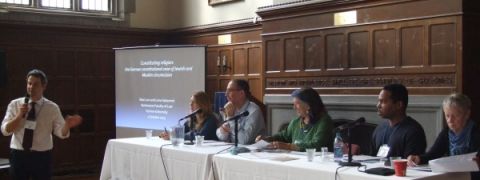
On Oct. 2 and 3, Queen’s Law hosted “Constitutional Culture: Identities, Texts, Institutions,” a packed two-day conference that showcased Queen’s talent and attracted speakers from around the world.
The conference was co-organized by Professor Tsvi Kahana of Queen’s Law and Professor Yishai Blank of Tel Aviv University’s Buchmann Faculty of Law, as part of a broader ongoing co-operation between the two law schools. Generously supported by the Jeremy and Judith Freedman Family Foundation, the conference included six panels with more than 30 speakers, commentators and chairs from Queen’s, Tel Aviv, the UK, University of Toronto and top U.S. law schools. Professor Mark Tushnet of Harvard served as rapporteur and wrapped up the conference on Saturday afternoon.
The lively discussion unpacked the notion of constitutional culture both at the theoretical level and in topical case studies, looking at judicial activism, LGBT rights, religious freedom, immigration and sex equality. The presentations and debate that followed gave up-and-coming scholars a chance to engage with leaders in this field, creating an atmosphere at once world-class and intimate.
Kahana was pleased with the conference’s interdisciplinary nature, noting, “the topic of constitutional culture (rather than constitutional law) allows for a multi-disciplinary and comparative discussion of the way cultures address constitutional issues and shape constitutions.”
A particular highlight was the keynote address by Reva Siegel of Yale Law School. A capacity crowd of students, faculty and alumni filled Wallace Hall to hear her speak about how constitutional culture enables communities to disagree, focusing on reaction following the U.S.’s Obergefell gay marriage decision.
The conference was also a unique opportunity for students, who were welcome to sit in on sessions and even had the option of attending the conference and writing response papers for course credit.
“This was the first true academic conference I have attended,” says Jess Spindler, Law’16. “Many of the papers presented were unpublished works in progress, and it was interesting to observe the exchange of ideas between scholars.”
For the organizers, the conference was the culmination of months of work and produced a remarkable cross-cultural dialogue about an increasingly popular topic.
“I’m happy that we succeeded in bringing in so many leading scholars from so many leading institutions, and facilitated a conversation that will continue,” says Kahana. “I’m also proud of the great interest among our excellent students, who made up half the attendants.”